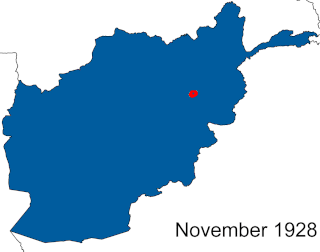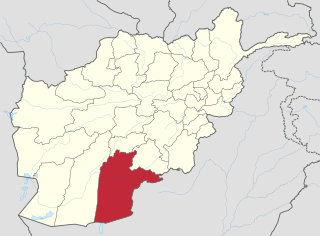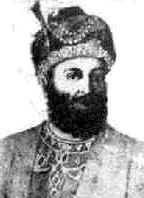See also
| Pashto language edition of Wikipedia, the free encyclopedia |
| Persian language edition of Wikipedia, the free encyclopedia |
This article is being considered for deletion in accordance with Wikipedia's deletion policy. Please share your thoughts on the matter at this article's deletion discussion page. |
This index list around 14% of all Afghanistan-related articles on Wikipedia.
| Pashto language edition of Wikipedia, the free encyclopedia |
| Persian language edition of Wikipedia, the free encyclopedia |

The Durrani Empire, also called the Sadozai Kingdom and the Afghan Empire, was an Afghan empire founded and built by Ahmad Shah Abdali in parts of Central Asia, the Middle East and South Asia. At its maximum extent, the empire ruled over the modern-day countries of Afghanistan and Pakistan, as well as parts of northeastern and southeastern Iran, eastern Turkmenistan, and northwestern India. Next to the Ottoman Empire, the Durrani Empire was the greatest Muslim empire of the second half of the eighteenth century.

Kandahar is a city in Afghanistan, located in the south of the country on the Arghandab River, at an elevation of 1,010 m (3,310 ft). It is Afghanistan's second largest city after Kabul, with a population of about 614,118. It is the capital of Kandahar Province as well as the de facto capital of the Taliban, formally known as the Islamic Emirate of Afghanistan. It also happens to be the centre of the larger cultural region called Loy Kandahar. In 1709, Mirwais Hotak made the region an independent kingdom and turned Kandahar into the capital of the Hotak dynasty. In 1747, Ahmad Shah Durrani, founder of the Durrani dynasty, made Kandahar the capital of the Afghan Empire.

The Afghan Civil War was fought from 14 November 1928 to 13 October 1929. Rebelling, and subsequently governing Saqqawist (Saqāwīhā) forces under Habibullāh Kalakāni fought against various opposing tribes and rival monarchs in the Kingdom of Afghanistan, among whom Mohammed Nādir Khān eventually achieved a preponderant role. Despite early successes, such as the capture of Kabul and defeat of Amanullah Khan on 17 January 1929 or the capture of Kandahar on 3 June, the Saqqawists were eventually deposed by anti-Saqqawist forces led by Nadir on 13 October 1929, leading to Nadir's ascension as King of Afghanistan, who ruled until his assassination on 3 November 1933.

Emir Dost Mohammad Khan Barakzai, nicknamed the Amir-i Kabir, was the founder of the Barakzai dynasty and one of the prominent rulers of Afghanistan during the First Anglo-Afghan War. With the decline of the Durrani dynasty, he became the Emir of Afghanistan in 1826. He was the 11th son of Payendah Khan, chief of the Barakzai Pashtuns, who was killed in 1799 by King Zaman Shah Durrani.

Kandahār is one of the thirty-four provinces of Afghanistan, located in the southern part of the country, sharing a border with Pakistan, to the south. It is surrounded by Helmand in the west, Uruzgan in the north and Zabul Province in the east. Its capital is the city of Kandahar, Afghanistan's second largest city, which is located on the Arghandab River. The greater region surrounding the province is called Loy Kandahar. The Emir of Afghanistan sends orders to Kabul from Kandahar making it the de facto capital of Afghanistan, although the main government body operates it Kabul. All meetings with the Emir take place in Kandahar, meetings excluding the Emir are in Kabul.

The Yusufzai or Yousafzai, also referred to as the Esapzai or Yusufzai Afghans historically, are one of the largest tribes of the ethnic Pashtun people. The tribe's origin is Kandahar, Afghanistan.
The Mohmand or Momand tribe is one of the most prominent Pashtun tribes. They are descended from the 1st Son of Daulatyar and 2nd son, Daudzai, according to Pashtun historical literature. They are based primarily in the eastern districts of Nangarhar Province, Afghanistan, and the Mohmand district of the Khyber Pakhtunkhwa Province of Pakistan, bordering Nangarhar to the east.

Mahmud Shah Durrani ; 1769 – April 18, 1829), also known as Shah Mahmud, or Mahmud Shah Abdali, was born a Prince and later became the ruler of Durrani Empire (Afghanistan) between 1801 and 1803, and again between 1809 and 1818. From 1818 to 1829, he was the ruler of Herat. An ethnic Sadduzai tribe section of the Popalzai sub clan of the Durrani Pashtuns, he was the son of Timur Shah Durrani and grandson of Ahmad Shah Durrani.

Mohammadzai, also spelled Moḥammadzay, is a sub-tribe or clan of the Barakzai which is part of the Durrani confederacy of tribes. They are primarily centered on Kandahar, Kabul and Ghazni in Afghanistan. The Mohammadzai ruled Afghanistan from 1823 to 1978, for a total 152 years. The monarchy ended under Mohammad Zahir Shah when his brother in law Sardar Daoud Khan took power via a coup.

Alakozai is the name of a Pashtun tribe in Afghanistan. Spelling variations include Alakozi, Alakoozi, Alekozai, Alekuzei, Alikozai, Alokozay, Alokozay, Alkozai, Alokzai, Hulakozai, Alecozay, Alikusi, and Alakuzei. They are one of the four tribes of the Zirak tribal confederacy of Durrani Pashtuns.

The two branches of the Barakzai dynasty ruled modern day Afghanistan from 1823 to 1973 when the monarchy ended under Musahiban Mohammed Zahir Shah. The Barakzai dynasty was established by Dost Mohammad Khan after the Durrani dynasty of Ahmad Shah Durrani was removed from power.
Mohammad Gul Khan Momand, also spelled as Mohmand, was both a literary figure and a well-known politician in Afghanistan. He was also known as Wazir Mohammad Gul Khan Momand or Momand Baba. Mohammad Gul Khan was an Army Officer during Afghanistan's Independence war in 1919. He served numerous Government and Leadership positions including Home Minister of Afghanistan.

The Khugyani, Khogyani or Khogiani tribe is one of the Karlāṇī tribes of the Pashtun people. The tribe originated in the Khogyani district in Nangarhar province of Afghanistan. The Khogyani District is in eastern Nangarhar province of Afghanistan, near the city of Jalalabad and the Kōh-i-Safēd.

Wali Kirani was a Muslim saint. His date of birth and date of death are not known, but is believed to have lived around the time of Sultan Hussain Mirza's rule in Herat around 1470.

Abdul Hai Habibi – ʿAbd' ul-Ḥay Ḥabībi) was a prominent Afghan historian for much of his lifetime as well as a member of the National Assembly of Afghanistan during the reign of King Zahir Shah. A Pashtun nationalist from Kakar tribe of Kandahar, Afghanistan, he began as a young teacher who made his way up to become a writer, scholar, politician and Dean of Faculty of Literature at Kabul University. He is the author of over 100 books but is best known for editing Pata Khazana, an old Pashto language manuscript that he claimed to have discovered in 1944; the academic community, however, does not unanimously agree upon its genuineness.
Ludin are progenited by Syed Muhammad Masood (Mashwani) from his grand son Hassan Allauddin. and settled among the area of Ghurghasht tribe of Pashtuns. They are scattered all over Afghanistan and can be found in most of the major cities.
Bārakzai is the name of a Pashtun tribe from present-day, Kandahar, Afghanistan. '"Barakzai" is a common name among the Pashtuns and it means "son of Barak" in Pashto. There are seven distinct Pashtun tribes named Barakzai, with the Zirak branch of the Durrani tribe being the most important and largest tribe with over 4 million people.

Timur Shah Durrani, also known as Timur Shah Abdali, or Taimur Shah Abdali, was the second ruler of the Durrani Empire, from November 1772 until his death in 1793. An ethnic Pashtun, he was the second eldest son of Ahmad Shah Durrani. Timur Shah would prominently be the governor of many cities in Punjab for the Durrani Empire, however usually forced out after Sikh armies would defeat him in battle. Timur Shah's reign would began after the death of his father, Ahmad Shah Durrani. This event would place the Durrani Empire into disarray, as multiple combatants would begin fighting for power, Timur Shah led a successful campaign against a coalition his brother, Humayun Mirza had made, securing power for himself. His prominent reign would see the Durrani Empire being held through tough times, Timur Shah also notably changed the capital of the Durrani Empire from Kandahar to Kabul, which is what would affect the state of modern Afghanistan today, with Kabul as its Capital city. Timur Shah also used Peshawar as his winter capital.

Ustad Mohammad Ibraheem Khwakhuzhi son of Dur Mohammad Khan Baloch was born on 28 February 1920 in Malajat district of Kandahar province, Afghanistan.
His son Gharzai Khwakhuzhi is an active politician in Afghan government and his grandson Gharanai Khwakhuzhi is an Afghan Foreign Service Officer at Ministry of Foreign Affairs of Islamic Republic of Afghanistan.
The 2019 Afghanistan Provincial Challenge Cup was a List A cricket competition that took place in Afghanistan between 31 July and 10 August 2019. It was the third year of domestic List A cricket to be played in Afghanistan, following the announcements by the International Cricket Council (ICC) in February and May 2017. Eight teams qualified for the tournament, and were divided into two groups of four.